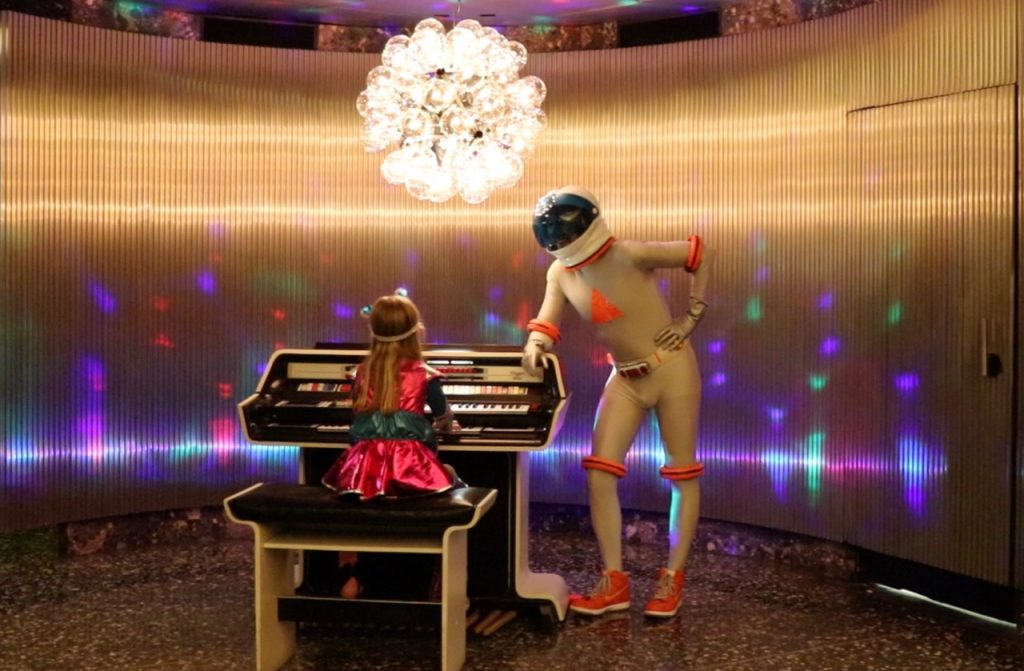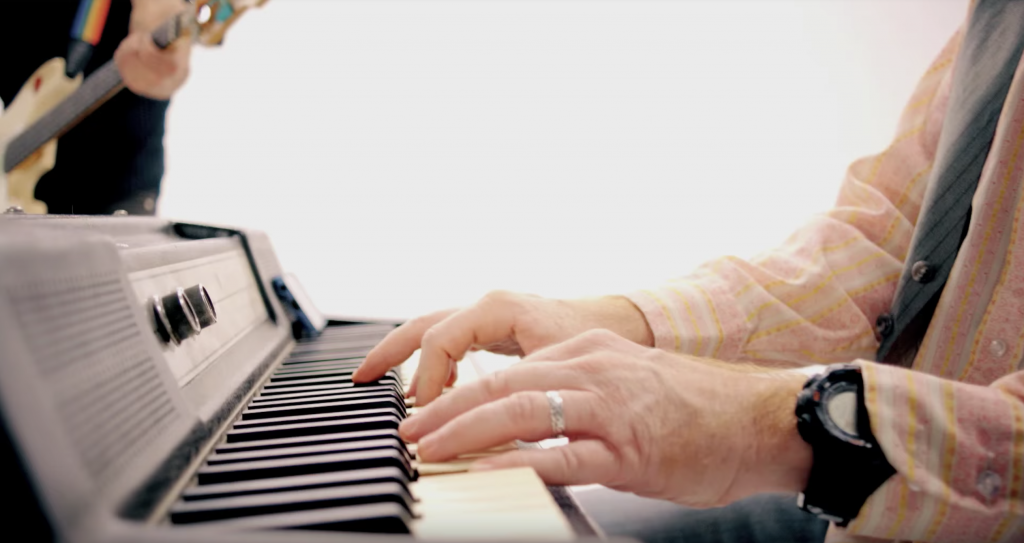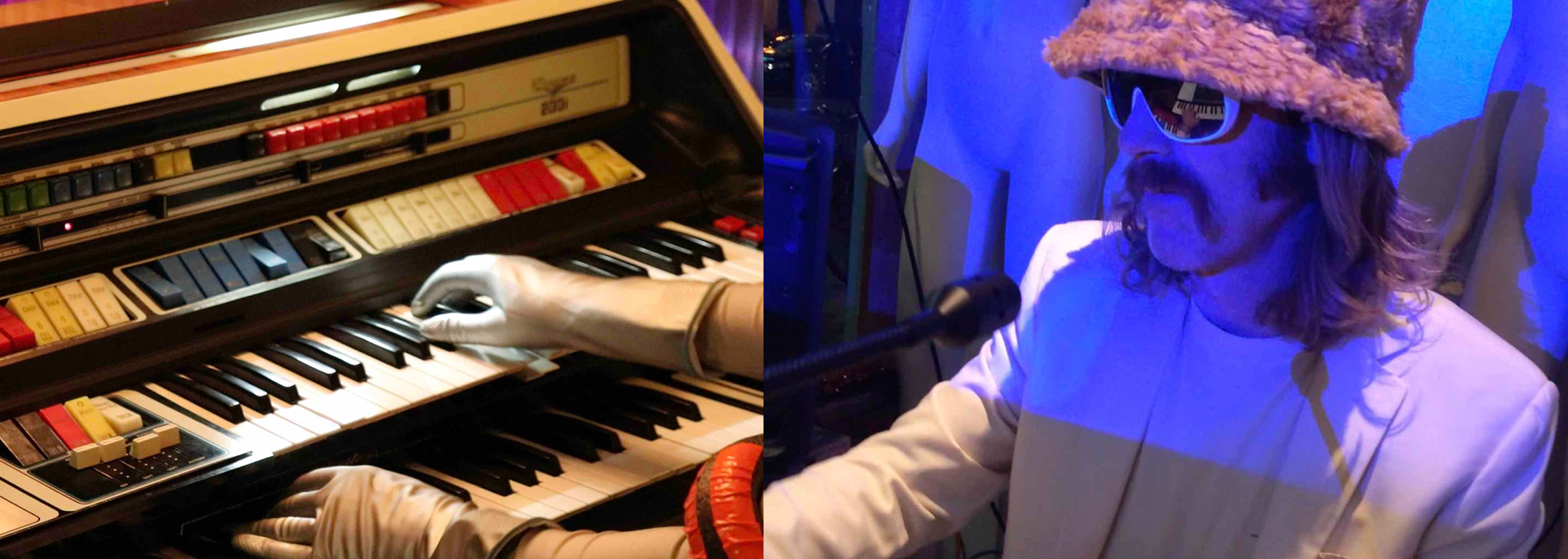By Keith Walsh
In the summer of 1981, just before the Orange County electronic music scene took off, I was swimming at the across-the-street neighbor of my lifelong pal Mike Moynahan. Mike was there, as was his brother Danny. I believe it was Danny who had curated the poolside music selection. Right within splashing distance was a turntable and two speakers, blasting the soundtrack for the 1977 film “Saturday Night Fever.” As the 80s took over, that film was a cultural artifact of a time gone by, yet for Danny and the rest of us poolside revelers, it was the soundtrack to summer fun.
The 70s have never lost their hold on Danny Moynahan. His debut solo album, “Decade Of Danny,” is a ten track disc that reveals the soul of a singer/songwriter doing his part to make the world a better place through music. Recorded over the last 20 years, the sound of the album is warm and intimate in the way the songs of the 70s were: there’s soulful keyboard chord voicings on his vintage Wurlitzer electric piano, touches of soul with sax, trombone and trumpet, and a sense of fun as he tells of a world where relationships are the most important things. Though the Wurlitzer electric piano is the most prominent instrument on the album, the collection also features a Korg MS 2000, which Moynahan says is his favorite synth, aside from his collection of organs and pianos.
The opening track “All The Souls” finds Danny at his Wurlitzer, in a brilliant arrangement that reflects on the beauty of life in the face of loss. The closing track, “Skip In The Dungeon” is a masterpiece that features a spoken word tale of Moynahan’s encounters with two homeless men as he plays his saxophone in a parking structure in West Los Angeles, where he went to practice because he enjoyed the acoustics of the space.
I asked him if he felt fear during these encounters. “Not really,” he says. “They were not threatening, but I did go down to the bottom floor of the parking structure, and I saw the guys. I was going to break out my horn. But there was some prejudice in my mind at play, thinking, because it is expensive, and if they get any crazy ideas about taking your horn from you, there could be a problem. So there was a little bit of that…I was being cautious. I went a floor up, and Skip came up to tell me that he was enjoying the music. I figured out pretty quickly that he was trying to stay warm, and he didn’t want to hurt me.”
‘I Almost Stopped Playing Music Altogether’
It was in the 70s when Moynahan discovered the music of some of his favorite artists. “ Earth Wind And Fire are way ahead of their time, and there’s nobody since Earth Wind And Fire that’s done what they did. And Stevie Wonder, there’s only one Stevie Wonder, and since Stevie Wonder there hasn’t been anyone that’s done that. I guess what’s with me and the 70s, they were just the best bands, the best sounds, they just don’t make them like that anymore.” Moynahan has been on journey of musical discovery, ever since.

After being forbidden from joining the high school band by his parents because of conflicts between his three older brothers and music teacher Fletcher Rainer III, Moynahan wasn’t phased, as his ambitions at the time were for basketball. It wasn’t until his brother Tim and friend Jon Mohr asked him to play with the J-Walkers that Danny got more serious about his musicianship. (He emphasizes that his parents were quite willing to provide music lessons for he and his four brothers, despite discouraging participation in high school band).
Some of the trouble the Moynahan brothers caused Sunny Hills include the publication in 1981 of a satirical underground zine called “The Horne” that infuriated Rainer. One memorable nugget from this zine was a musical glossary. To wit: Allegro: When Mary sat on my lap, i felt allegro. There’s more to the brothers’ banishment from the band however. “In short,” Moynahan explains, “it was because Rainer was really uptight and they were exactly the opposite — they were the anti uptight guys. They had too much fun and they got kicked out of band a bunch of times. So my mom and dad figured that I had three strikes against me going into the band, and they said ‘we don’t want you to play in the band.'”
“I almost stopped playing music altogether,” he says. “And then one day, it was a hot summer day before my junior year, Tim and Jon invited me to rehearsal, they said ‘get your horn,’ come with us.’ I said ‘no, I have stuff to do,’ and they said ‘you don’t have anything to do.’ And I said “well the Twilight Zone is coming on …. and I was going to watch the Twilight Zone.’” His brother and friend persisted, and Danny ended up finding the rehearsal and subsequent shows to be life changing experiences.
“I went to the J-Walkers rehearsal,” Danny says. “The J-Walkers were my favorite band in the world, and here I was rehearsing with them, and their next gig was going to be a wedding for some family friends of ours – they invited me to play on a few songs, and I ended up playing the whole time. And the next gig they invited me to play, and that was it. I was hooked. I loved that band.”
Newly inspired, Danny took the initiative to study both saxophone and piano, with Penny Watson and Charlie Shoemake, respectively. Of Shoemake, Danny says, “that was jazz studies, and that opened up my ear to other harmonies.” This approach to alternative melodic approaches shows up on “Decade Of Danny,” which features sophisticated chordal arrangements and soulful song structures.
The second song on “Decade Of Danny.” “Butt Naked,” addresses brotherly relationships with the wit that is a signature of Moynahan’s writing style. He says he usually starts writing on his piano. “I enjoy writing songs, it a very creative process that I just enjoy, creating something out of nothing. And by something I mean melody and harmony and groove. I usually start with a groove or a chord progression that’s pleasing to the ear, and then I usually go looking for a melody that fits nicely on that chord progression, and then typically come up with some lyrics last.”

‘Bigger Issues Going On In The World’
Moynahan had mixed feelings about releasing “Decade Of Danny” in the midst of the pandemic and social unrest. He explains: “I put it out in May, and I didn’t really feel like announcing it. I just didn’t care. There were a lot bigger issues going on in the world, in the country. I was really surprised, but happy to see the level of awareness and outrage and activism around the killing of George Floyd and Breonna Taylor and others, and I didn’t feel liked doing a big announcement, it didn’t feel appropriate for the time.” It wasn’t until September that Moynahan finally made a Facebook post announcing his album to the world.
In the years since starting with J-Walkers, Moynahan has played with multiple bands, including String Theory, The Love Uninhibited Orchestra, Boss Knob, and Ska ‘N’ Bones with Mohr, his brothers Tim and Mike, and yours truly. Boss Knob in particular had been very active until the pandemic hit. During these recent months, In addition to releasing “Decade Of Danny,” Moynahan has worked on musical videos with Boss Knob drummer Richard Fultineer. “My Boss Knob bandmate Richard sends these one minute drum videos, ever since the quarantine started,” he says. “ I just imported the video in to Logic.” I asked Moynahan about the video for “Put Your Flipping Mask On,” with its Zappa-esque rhythms. “I just started poking away at it, and coming up with a groove and a melody, and listening to his phrasing, and that’s what I came up with, in just a one minute – it’s like an Instagram format. I’m really enjoying the one minute video format.”
The Oracle Of Killamery
After studying music in his high school years, and somewhat during college at Cal State University, Fullerton, where he achieved a Bachelor’s in Latin American Studies, Moynahan was still somewhat unsure of whether music would play a major role in his life. “I was kind of asking those big questions,…how do i fit in this world? What is my destiny?” His life changed forever on a trip to Ireland in the early 90s, when he and his brother Mike met the man they call The Oracle Of Killamery.
Moynahan explains: “Mike and I were traveling through Ireland and on this day we decided that we would try to find the farm in Killamery that my great grandfather grew up on.” I asked Danny if he had an address or any leads. “We had nothing,” he says, Their ancestors’ name was “O’Shaughnessy, or as they were known, back then Ó Seachnasaigh, Mike and I set out from Kilkenny and took a bus about a half an hour from Kilkenny, to this little town called Callan, and we got off the bus and we didn’t know what to do next, but we knew it was the closest we could get to Killamery, so we stepped into this little grocery mart, tiny little family owned market, it was called Vaughn’s, and we asked a lady behind the counter if we could get a taxi cab to Killamery. And she looked at us weird, partly because we were Yankees, and partly because we were asking for a ride to Killamery–like apparently there’s nothing in Killamery.”
“So she got on the phone, and she said ‘Chris, there’s two Yanks here that want to go to Killamery, they want to see the Killamery farm.’ It seemed like something was up. Like she knew something we didn’t know. Well Chris Vaughn shows up in his cab, and says, ‘get in the cab, I’ll take you to Killamery farm, it turns out his family lived on the adjacent farm, and what’s more, his family, the Vaughns and O’Shaughnessys, were connected, in marriage, so the cab driver that we got not only knew the farm, but he grew up there, so he took us there, and he spent like three hours with us, showing us the farm, telling us all kind of stories about our families cracking us up, showing us the farmhouse that was falling apart, and the well, all it was so great, we were so just we so taken, so full of joy at how that whole day transpired and the magic of that whole day. And we told him so, awe thanking him profusely, he didn’t charge us, his meter was not running, he did that just out of kindness.”
As amazing and serendipitous as this story is, it just gets more fantastic. “He said, ‘well, if you want to hear some more stories, some better stories about the Ó Seachnasaigh’s, you should talk to my father, Jim.'” Moynahan says.
“We called Jim Vaughn, I called him from Kilkenny, we were back in Kilkenny, in a little hostel, we called him and we talked, we had a good talk, and we decided we would get together at this little pub, Langton’s at 8 o’clock. And I was so psyched that we had a meeting I almost hung up without finding out where to find him. And before I hung up I said wait, wait Jim, how will we know, how are we going to find you. You know, in the middle of this pub. And he said, ‘don’t worry about that I’ll find you. And I said ‘what you mean you’ll find us?’ And he says, ‘well you do sing , don’t you?’”
Danny continues: “And at the time, yeah, I sang, but I didn’t really consider myself a singer, he goes ‘you guys are singers, aren’t you?’ and I thought about it and I said ‘well, yeah, I guess I am, I am a singer’, and though I’ve been singing all my life I’ve never considered myself a singer. And he goes ‘well of course you sing, because all the O’Shaughnessys were music men, and I’ll find you, because you’ll be singing.’. And I got goosebumps all over. And I got off the phone, and I told Mike and he got goosebumps all over. And so he, that song is about you know, it’s about hearing from the Oracle of Killamery that we are the music makers, and we are the dreamers of dreams. That’s a quote from Arthur O’Shaughnessy, the writer, and I just thought, wait a minute this is all just too coincidental, and I discovered that quote in an airport on that same trip. And so that’s was that was affirmation, that whatever I’m doing in life, whether I’m you know digging trenches or teaching in a classroom or making music, it doesn’t matter, that was an affirmation, that I am a music maker, that there’s music inside of me.
Let Me Be Water
Danny says one song he sang that night in the pub in Ireland with his brother Mike was “Behold,” by the Blues Busters, a tune that he used to perform with the J-Walkers. Since then, Moynahan has found musical inspiration in everything from dance to cinema, fashion to photographs. The track “Let Me Be Water,” features a minimalistic approach to composition. It was inspired by the photos of Tom Gianakopoulos, taken in Japan. There is serendipity in Moynahan being selected for this project, as he explains: “All the photographs gave me a sense of calm, and peacefulness and patience,” he explains. “At the time I was reading a lot of Thich Nhat Hanh and even spending time at the monastery in Escondido. ‘Let Me Be Water’ means let me just be. Water will take the shape of any vessel that it fills. It can take any shape, it can be very still and calm, also water takes the path of least resistance. And I saw that in all the photos I was looking at. Zero resistance — just peace.”
http://dannymoynahan.com/studio/
finis
